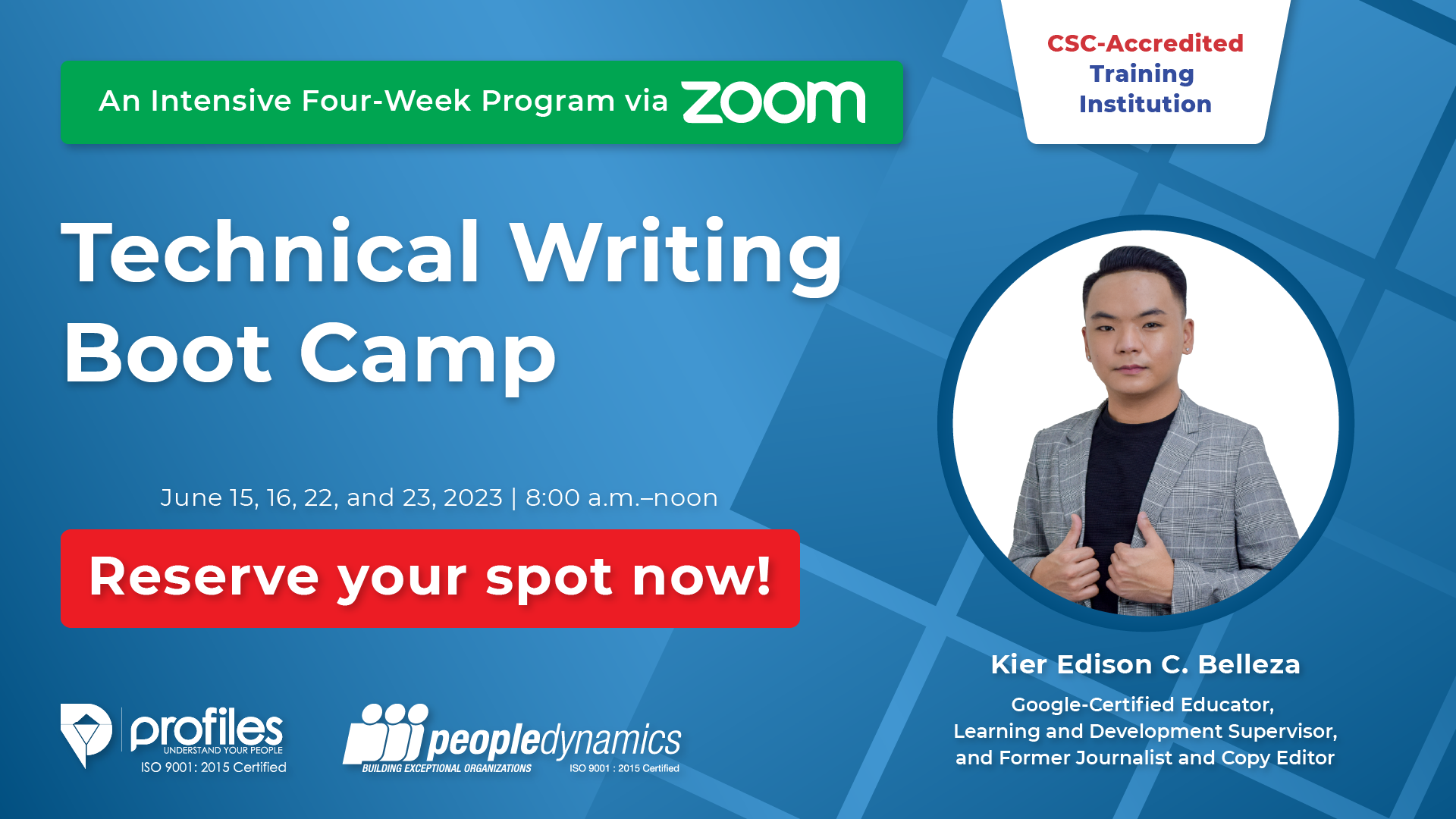Communicating technical information to a nontechnical audience can be challenging.
Oftentimes, technical people are so passionate and close to their subjects that they lose sight of who will read what they have written and what their level of knowledge is.
This boot camp aims to bridge this communication gap.
The boot camp consists of four four-hour sessions, two per week, over a period of two weeks. Sessions are delivered via Zoom.
A pretest and posttest will be given at the beginning and end of this camp to measure growth in the participants’ technical-writing skills.
At the end of this training, you should be able to
- learn the techniques for writing professional and easy-to-understand technical documents,
- make complex data and detailed information meaningful to nontechnical readers, and
- apply effective editing techniques to polish technical writing.
PRE-ASSESSMENT: Grammar Skils Test
- The Principles of Technical Writing
- Clarity
- Conciseness
- Accessibility
- Readability
- Neutrality
- Styles in Technical Correspondence
- Paragraphs
- Compartmentalization
- Topic Indicators
- Message Patterns
- Direct Approach
- Indirect Approach
- AIDA Approach
- Punctuation
- Period
- Comma
- Colon
- Question Mark
- Exclamation Point
- Hyphen and Dashes
- Lists
- Run-In List
- Unordered Vertical List
- Ordered Vertical List
- Vertical List Punctuated as a Sentence
- Vertical List with Subdivided Items
- Capitalization
- Acronyms
- First Mention
- Proper Nouns
- Points of the Compass
- References to Numbered or Lettered Items
- Civil, Military, Religious, and Professional Titles
- Kinship Names
- Numerals vs. Words
- General Rule
- Ordinals
- Large Numbers (in the Millions or More)
- Scientific Contexts
- The Day of the Month (Cardinals)
- Time of Day
- Percentages
 Kier Edison C. Belleza got his career start as a journalist at the Manila Bulletin in 2017. He was only in college at the time.
Kier Edison C. Belleza got his career start as a journalist at the Manila Bulletin in 2017. He was only in college at the time.
Writing for the Philippines’ leading national newspaper allowed him to learn the ins and outs of the media industry.
It also made him experienced in the Associated Press style, the go-to style for news writing.
Despite juggling school and work, Kier graduated cum laude with a communication degree from Cebu Normal University.
After working as a journalist, he redirected his career to publishing.
Initially, he worked as a correction editor at an outsourcing company in Cebu City that services publishers across the United States and the United Kingdom.
He then became a copy editor professionally trained in the Chicago Manual of Style, the most widely adopted style manual for publishing across all disciplines.
At present, Kier works as the learning and development supervisor for People Dynamics Inc.
He is a highly regarded trainer with a reputation for delivering content in ways that are practical, relevant, and “sticky.”
He has trained over 1,000 professionals from different government agencies, educational institutions, and business organizations nationwide.
He delivers workshops in writing, editing, verbal skills, public relations, training and development, among others. His classes consistently generate great feedback.
At the same time, he also works as the communications officer for Profiles Asia Pacific Inc., the country’s leading and premier provider of psychological assessments.
In keeping with his dedication to continuous learning, Kier is now working on his master’s degree in communication at the same university where he obtained his bachelor’s degree.
He is certified in the DISC model of human behavior, which enables him to use DISC for training, coaching, and facilitating at all levels of an organization.
He is also a qualified emotional intelligence practitioner with Genos International. This capacitates him to offer valuable insight into professional and personal well-being.
Finally, Kier is a Google-certified educator who has the skills and knowledge to work at the forefront of educational technology.
People Dynamics is an accredited Learning and Development Institution by Profiles International, LLC., Wiley, Genos International, Civil Service Commission, and the Professional Regulation Commission.


